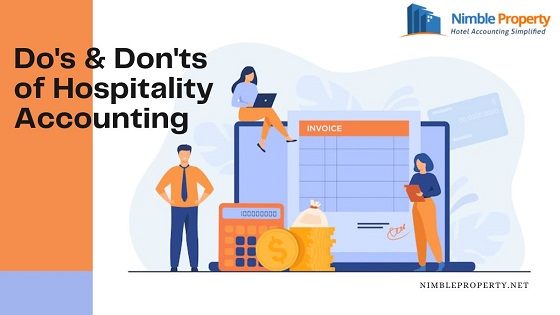If you are in charge of accounting for your hotel, or any other hospitality business, there are some key dos and don’ts to stay on top of the books. The way that accountants work is important for ensuring that your hotel businesses remain financially stable as well as up-to-date with all current tax numbers. Any mistakes made during accounting could prove disastrous for your business, so it is crucial to make sure you have a professional accountant looking over your shoulder or a hotel accounting software keeping you in check. Here are some great tips on how to stay on the right side of the law while staying profitable.

The Dos:
1.) Only charge what is documented via receipts or invoices.
This is one of the biggest mistakes you can make as an accountant in the hospitality industry. It is too easy to take a few dollars off here and there in this business, but if you are caught doing so, you could lose not only your job but also be charged with tax fraud. Keep a record of all of your expenditures and if possible provide supporting documentation.
2.) Always keep accurate records.
You may not realize it but there are instances where receipts are required for any purchase over a few dollars. If you do not have proof of payment for something, that cost becomes taxable income. There are also instances where receipts need to be kept for employment taxes along with paying sales taxes on every transaction. You may need to provide receipts for income tax deductions, sales tax exemptions and more.
3.) Double check your books every month.
There is nothing worse than being accused of stealing or making income tax mistakes because you were too lazy to check the numbers twice. As an accountant in hospitality, you should always take a second look to make sure the numbers add up. If there are errors, correct them before anything else so it doesn’t become a huge problem later on. If you don’t think you can do all of this in-house, consider hiring an outside professional to ensure that everything is going smoothly and legally.
The Don’ts:
1. Don’t try to fix any mistakes all on your own.
It is much easier to get caught making an error if you are trying to cover it up. You need to be honest with yourself, and just come right out and admit that you made an honest mistake or have received a bad tax form. A professional accountant can help you figure out what went wrong and how to make sure it doesn’t happen again.
2. Don’t make entries without proof of payment.
If you make purchases for such things as equipment, furniture or inventory, keep receipts for everything since it could be considered a business expense. Also, keep receipts for other expenses such as travel and entertainment since they may be considered business-related. If you do not have proof of payment, you could be forced to pay taxes on the entire cost of an item when only a part of it was for business purposes.
3. Don’t forget about tax returns every year.
Make sure that you are filing for tax extensions or getting any required forms in on time every year. If you delay your tax return, the IRS will start hitting up your bank account or making deductions from your pay check until what is owed has been paid in full. Get any forms filed within time limits to avoid any further issues down the road.
I am from a hotel accounting background, and I have created this article to address the dos and don’ts of accounting for the hospitality business.
The thing that needs to be said about hospitality accounting is that it can be complicated. You also need a team of specialists in order to properly manage your business, including an accountant, bookkeeper, and tax professional. These are just a few of the many people who are essential in managing your accounting needs.
You should also be aware that accounting for hospitality is not just about numbers, it also involves communication with your customers and maintaining a strong relationship with them. Events and announcements are key to this aspect of hospitality accounting because you want to make sure that all your guests are aware of any promotions or changes you are making to your business.
As you grow throughout the business world, more people will be involved with the company’s daily operations to an extent that they may not have expertise in certain areas, but hotel accounting partners can always help by ramping up their knowledge in that specific area when needed.
It can also help you track your cash flow and make sure all your purchases are properly documented, which can act like a “check and balance” on your business operations, ensuring nothing gets overlooked in the day-to-day happenings. Some of the areas where an accountant’s skills can be used to assure proper tracking and documentation include:
- Preparing financial statements
- Performing accrual-based accounting functions such as closing entries, accruals, etc…
- Managing receivables (new clients, collection issues)
- Managing Payables (bills for operating supplies, payroll expenses)
- Preparation of tax returns and tax planning
- Keeping accurate accounts and records
- Providing advice to the management
- Providing guidance to the management
- Acting as an internal auditor of accounts
Performing reconciliations of financial statements with financial records and other sources of information not directly related to the preparation or presentation of financial statements.
Providing assurance regarding the accuracy of income statements, statements of cash flows, and notes for prior periods presented in accordance with generally accepted accounting principles.
Reviews the accounting data which is reported through the year & compares it to industry standards to evaluate efficiency within the company. It also identify trends & assist in preparation of budgets & projecting future income/expenses & cash flow (funding).
Business management oversees the financial records and reports prepared by their staff accountant or outside accountants and approve these record prior to submission to auditors or government agencies.
The more you understand accounting for hospitality, the better your business will be. Use my experience to learn how to keep track of your finances easier, and how to avoid making costly mistakes in your accounting practices.
Finally, I would just like to say that hospitality accounting is a fun but challenging process that will leave you feeling happy when it’s all said and done. Be sure to use my advice in order to maximize your profits and growth potential with this line of work. Good luck!
SUMMARY
Position Your Accounting In Order For Greater Success
People in the hospitality industry are often surprised to hear that it is not a requirement to have an accountant as part of their staff. In fact, these businesses can often get by using spreadsheets and a simple cash register.
However, there are some who do see the importance of this knowledge, and they strive to understand not only how it works on paper but also why the numbers need to be accurate.
As such, this article will explore what exactly accounting is all about when it comes to hospitality and provide both dos and don’ts that you should keep in mind when looking into this field.
The Dos and Don’ts of Accounting in Hospitality Business
1. Don’t use a calculator at all times.
You’d be surprised to know that a lot of people use their calculator when running the books – whether this is to hide errors, or because they think it’s quicker than using pen and paper.
Unfortunately, you should never ever do this even if you want to save time and effort at the end of the day. Doing so can actually lead to over-estimating your profit by as much as 40%.
2. Be sure that all expenses are included in your bookkeeping system.
Interested in reading more on the blog? Go to nimbleproperty.net/blog

















